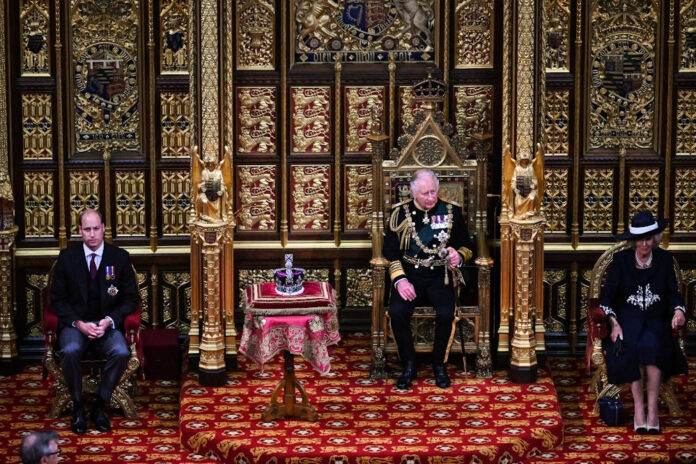Britain’s Prince Charles, Prince of Wales (2nd right) sits by The Imperial State Crown (2nd left) with Prince William, Duke of Cambridge and Camilla, Duchess of Cornwall in the House of Lords Chamber, during the State Opening of Parliament, in London May 10, 2022. — AFP pic
LONDON, May 10 — Head of state Queen Elizabeth II will miss today’s ceremonial opening of the UK parliament for the first time in nearly 60 years, handing the duty to her heir Prince Charles in a clear sign of the looming transition of power.
The 96-year-old monarch usually presides over the pomp-filled event and reads out her government’s legislative programme from a gilded throne in the House of Lords.
But Buckingham Palace said late yesterday she would skip the annual showpiece on medical advice, making the decision “reluctantly” as she continues to experience “episodic mobility problems”.
It is the latest in a string of cancelled public appearances caused by health problems and old age indicating her record-breaking 70-year reign is drawing to a close.
Charles will be accompanied at the high-profile state engagement by his eldest son, Prince William, who is second-in-line to the throne.
The queen has rarely been seen in public since spending an unscheduled night in hospital last October, and has complained of difficulties standing and walking. She also contracted Covid-19 in February.
She has missed only two state openings — in 1959 and 1963, when she was pregnant with Prince Andrew and then Prince Edward.
Her decision heightened fears that she may not be able to play a full part in public celebrations next month celebrating her Platinum Jubilee.
‘Historic moment’
In changes to the Westminster ceremony, Charles, who is 73, will not wear the queen’s imperial state crown even though he and Prince William will bring it by car, The Times reported.
Symbolically, the throne in the upper chamber of parliament where the queen usually sits to deliver her speech will remain empty.
Royal expert Robert Hardman wrote in the Daily Mail that the queen “remains very much in charge” but called the handover a “historic moment”.
The Times wrote that for Charles — the longest-serving heir to the throne in British history — this is “the nearest he has come to performing the duties he will one day undertake as king”.
It will be William’s first time attending the state opening, in another clear sign of the family preparing for a future beyond Elizabeth and Charles.
The queen announced last week she will not attend this summer’s royal garden parties, and has only appeared once in public since October — at the March 29 memorial service for her late husband Prince Philip, who died last year aged 99.
‘Back on track’
The queen’s absence has overshadowed the unveiling of the new parliamentary session in which Prime Minister Boris Johnson will try to reinvigorate his faltering government by unveiling its plans for the coming year.
Reeling from a series of scandals and dire results for his ruling Conservatives in local elections last week, he is promising 38 bills to get his agenda “back on track”, Downing Street said.
They will focus on boosting economic growth and paving the way for more “high-wage, high-skill jobs”, as well as tackling the spiralling cost of living.
The upcoming parliamentary session — the current government’s third — is one of Johnson’s last opportunities to deliver on his key policy promises before the next general election due by May 2024.
Johnson won an 80-seat majority in December 2019, vowing to reap rewards from Brexit and tackle decades of growing regional inequality.
Despite securing Britain’s withdrawal from the EU with a comprehensive trade deal, the coronavirus pandemic upended delivery of his domestic agenda.
His government was soon consumed by the pandemic and then sidetracked in recent months by various controversies, including the so-called “Partygate” scandal.
That saw Johnson become the first UK prime minister found to have broken the law while in office, after police ruled he and staff had breached Covid-19 lockdown rules.
He is now hoping his legislative programme can help draw a line under his recent woes, not least the loss of nearly 500 councillors across England, Wales and Scotland last week.
But he faces a daunting challenge as the growing cost-of-living crisis begins to bite, with bleak economic forecasts. — AFP



